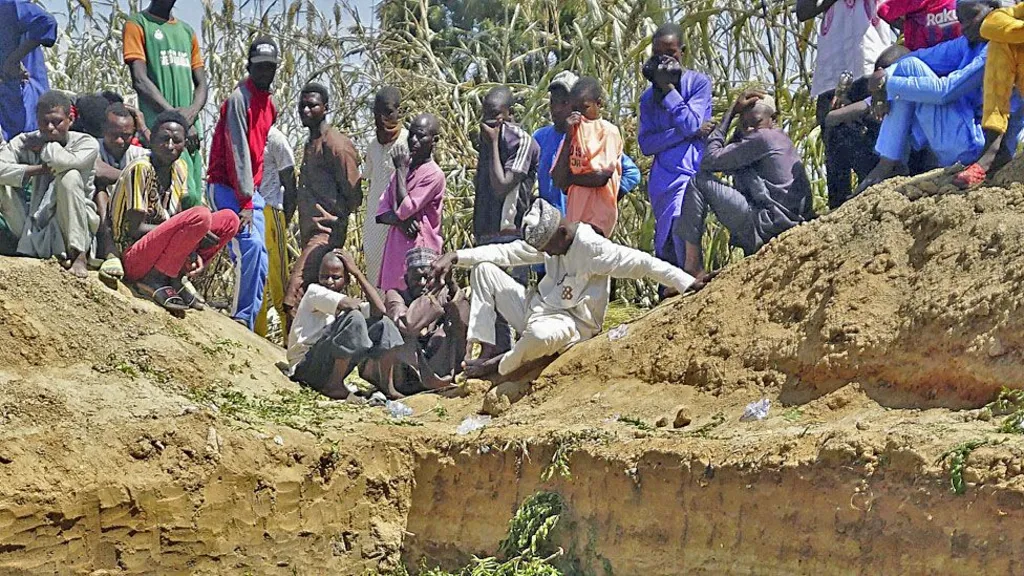Tragedy Strikes: Tanker Explosion Claims Lives in Nigerian Community
3 min read
Majia is in shock and most of those who died in the tanker explosion have been buried in a mass grave

Majia is in shock and most of those who died in the tanker explosion have been buried in a mass grave
Mustapha Majiya, a Nigerian farmer from Majia town, is grappling with an overwhelming sense of loss after a catastrophic tanker explosion claimed nearly 50 members of his extended family this week. Among the deceased were his nephews, 16-year-old Nuradeen Rabiu and 17-year-old Dini Babalo, who tragically lost their lives while attempting to prevent others from approaching the overturned fuel tanker.
The explosion occurred late Tuesday night in Jigawa, northern Nigeria, and has been labeled one of the deadliest tanker incidents in recent years. The death toll has reached at least 170, with many victims burned beyond recognition, while around 100 others are hospitalized, some in critical condition.
The ill-fated tanker, laden with petrol, lost control on a poorly lit main road when the driver encountered another vehicle. When local residents realized there was petrol available, many—predominantly young men and teenagers—rushed to the scene with buckets and containers to collect the valuable liquid, disregarding the evident risks.
In recent months, skyrocketing petrol prices and persistent fuel shortages have fueled a cost-of-living crisis across Nigeria, prompting desperate attempts to seize any opportunity to gather fuel. Mr. Majiya expressed disbelief over the loss, stating, “I just bought them books and new uniforms for the term.”
Additionally, Mr. Majiya mourned the loss of his longtime friend, Jamilu Maigaji, a 55-year-old family man with two wives and 13 children, who was also at the scene collecting fuel. “Some people were just onlookers and didn’t understand the dangers of being around the scene,” he lamented.
As a devout Muslim, Mr. Majiya attempts to accept what he sees as God’s will in the face of tragedy. However, he recognizes that such disasters are part of a troubling pattern in Nigeria, where tanker-related accidents are frequent. Experts argue that these incidents could be mitigated with improved safety measures and strategic planning.
In Nigeria, a leading oil-producing nation in Africa, most petroleum products are transported via road, a situation criticized by urban developer Kola Ashiru-Balogun. “No other country relies solely on roads to transport goods. The government must invest more in freight rail systems,” he stated.
The frequency of accidents is alarming; in 2020 alone, there were over 1,500 fuel tanker incidents, resulting in 535 fatalities, according to Nigeria’s Federal Road Safety Corps. Just last month, another tragic accident occurred in Niger state, claiming 59 lives when a fuel tanker collided with a passenger-laden truck.

The chaos of the Majia explosion was compounded by another tanker incident occurring simultaneously in Ogun state, where a tanker overturned and spilled fuel near a bank. Fortunately, there were no casualties, but significant damage to property ensued.
In response to the tragic explosion, the Nigerian Senate urged the National Orientation Agency to enhance public awareness about the dangers associated with approaching accident scenes involving fuel tankers. Vice-President Kashim Shettima echoed these sentiments, emphasizing the need for increased safety measures and public education to avert future tragedies.
Last week, he attended the launch of the National Road Safety Advisory Council (NARSAC), aimed at improving government coordination for road safety. However, safety experts like Timothy Iwuagwu, president of the Institute of Safety Professionals of Nigeria, argue that the failure lies not in the absence of policies but in the lack of political will to implement them effectively.
He pointed to various contributing factors to tanker accidents, including poorly maintained roads, inadequate vehicle inspections, and untrained drivers. “The force of a tanker hitting the ground isn’t enough to cause an explosion. The real issue is the poor construction of these tanks by unqualified personnel,” he noted.
Despite the ongoing economic hardships exacerbated by recent policy changes—like the removal of fuel and electricity subsidies leading to a 500% price increase—people are compelled to take risks. The naira has depreciated significantly, inflation exceeds 32%, and nearly half the Nigerian population lives in poverty.
While the government has pledged an investigation into the Jigawa explosion, historical patterns suggest that accountability and compensation for victims’ families are rare. Mr. Majiya’s community is left grappling with grief, awaiting governmental support that remains uncertain.
As Nigeria mourns, the call for action grows louder, urging the government to take responsibility for safeguarding its citizens against preventable disasters.